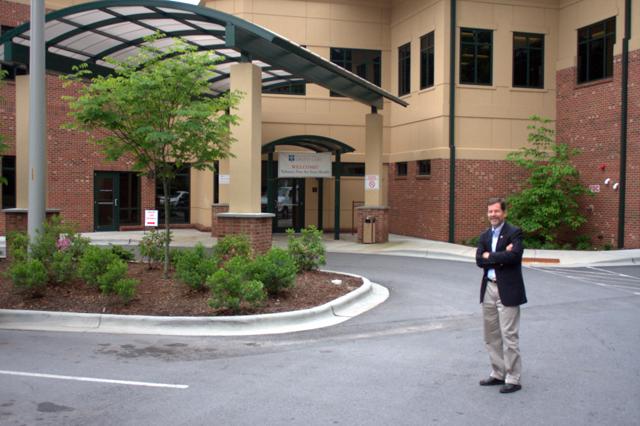EDITOR’S NOTE: The 2011 Building Healthy and Sustainable Communities Conference has been canceled.
We can change our lifestyles; we can change how we interact with each other; we can change our future. That’s the word from Olson Huff, a local pediatrician who helped draw the health community into Mountain Green, an annual sustainability conference held at Warren Wilson College. This year’s theme is "Building Healthy and Sustainable Communities," and it’s cosponsored by the college’s Environmental Leadership Center and the Asheville-based Mountain Area Health Education Center.
“Health, environment and economics are not isolated areas; they are all intimately interwoven,” says Huff, medical director for the North Carolina Center for Health and Aging at MAHEC. By bringing those three elements together, the conference provides "the opportunity to [collaborate] and build a coalition to help communities sustain themselves into the future and a base on which that sustainability can be maintained," he continues.
Here’s the idea: Medical providers, health educators and administrators can rub elbows with environmental advocates, developers, realtors, architects and general contractors who’ve got an interest in green building. The aim is getting them to network and consider practical strategies toward a common goal: creating a healthy and ecologically minded community in Western North Carolina for the long term. Says Huff, “We have to make them compatible companions as we try to develop a future that is more viable for our children and an environment that’s more livable for us now.”
While in the past the conference has focused on sustainability and green-building issues, this year, organizers have added such topics as creating healthy work and living environments, supporting healthy foods from farm to cafeteria, designing sustainable school and medical facilities and navigating the legal liability issues involved in green building. Here are few highlights:
“Investing in Healthier Communities,” the keynote presentation by Laura Gerald, executive director of the N.C. Health and Wellness Trust Fund, will update participants on how our state’s share of the tobacco master settlement funds are being used to improve the health of North Carolinians. In another session, Project Manager Garrett Shreffler will preview Mission Health System’s new, LEED-certified cancer center, scheduled to open in early 2012. (Run by the U.S. Green Building Council, the Leadership in Energy and Environmental Design program offers third-party certification for sustainable construction practices.) And Sisters of Mercy Urgent Care CEO Timothy Johnston will outline what’s green about the organization’s Patton Avenue clinic. “We didn’t get LEED certified, but we did things I think anyone could do,” such as installing water-saving bathroom fixtures and emphasizing daylighting inside and out.” He points out that Sisters of Mercy’s mission includes “acting in harmony and interdependence with all creation. … Our desire to create a green building is at our … core.”
Buncombe County Schools Facilities Director Tim Fierle will show what sustainable school buildings look like: He’ll report on the district’s two LEED-certified intermediate schools, now under construction. Striving to develop a healthy, sustainable community where children learn, the school system has taken a holistic approach in the planning and construction of the new Koontz and Eblen Intermediate Schools.
Meanwhile, in a collaborative session offered by the YMCA and Asheville-Buncombe Institute of Parity Achievement, participants will examine health disparities based on race in our region and learn how these groups are working to create resilient communities by reducing barriers to healthy living in underserved populations.
In a novel offering, Asheville attorney Robert Deutsch will seek to challenge builders, subcontractors and their clients to educate themselves. “Just because it’s green, doesn’t mean it’s clean … of liability issues,” Deutsch quips. “Say you contracted with a builder to build a LEED-certified house, but you specified some material that [later] disqualifies you from certification. Or say you have an allergic reaction to a material used. Whose responsibility is it?
“We’re excited about bringing this topic to the conference because we actually deal with these issues in our practice,” Deutsch tells Xpress.
Environmental Leadership Center Director Margo Flood mentions one other conference goal: integrating the needs of small businesses. “It’s small businesses that are going to support the shift to resilient community. … It’s small businesses that make the choice to sell truly green products and services, transforming their practices so they’re more compatible with a sustainable future. They’re leading the way.”
— Susan Andrew can be reached at 251-1333 ext. 153, or sandrew@mountainx.com.




Before you comment
The comments section is here to provide a platform for civil dialogue on the issues we face together as a local community. Xpress is committed to offering this platform for all voices, but when the tone of the discussion gets nasty or strays off topic, we believe many people choose not to participate. Xpress editors are determined to moderate comments to ensure a constructive interchange is maintained. All comments judged not to be in keeping with the spirit of civil discourse will be removed and repeat violators will be banned. See here for our terms of service. Thank you for being part of this effort to promote respectful discussion.